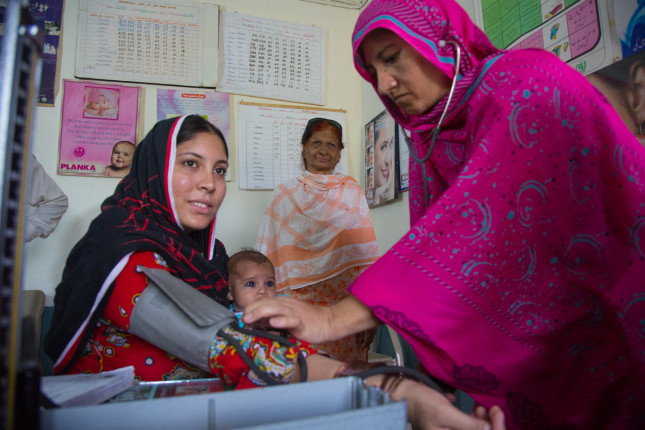-
Sharing Stories: Prioritizing Sexual and Reproductive Health in Universal Health Coverage
September 7, 2022 By Alyssa Kumler
“Globally women and girls continue to face barriers to access healthcare services—whether it be transport costs, financial costs, or even language barriers,” said Shakira Choonara, Technical Specialist with the World Health Organization (WHO) at a recent launch event of the Sexual and Reproductive Health (SRH) and Universal Health Coverage (UHC) Learning by Sharing Portal (LSP).
Co-developed by WHO and the United Nations Population Fund (UNFPA), the LSP is the first ever global resource providing national-level implementers and decision makers access to strategies on how to address and integrate SRH care issues within UHC. The portal was developed in response to the lack of prioritization of SRH issues in global UHC strategies. As more countries are moving toward universal health coverage, the knowledge on how to ensure proper integration of SRH is limited, said Dr. Lale Say, Unit Head of SRH Integration into Health Systems at WHO.
The LSP addresses this evidence gap by offering invaluable insights into country level experience and best practice interventions for scale-up. The rich collection of implementation stories are developed by synthesizing peer-reviewed research, WHO/ UNFPA led projects which advance SRH-UHC, and through a regular Open Call for stories. These stories offer scalable solutions and have all been nationally vetted and endorsed.
The portal’s initial offerings include nine stories from India, Nepal, Mexico, Malawi, Somalia, Kazakhstan, Pakistan, and Zambia, with more stories under development. “We decided to invest in storytelling,” said Pascale Allotey, Director of the Department of Sexual and Reproductive Health and Research at WHO. “We’re building a body of evidence for an action-oriented agenda.”
Stories are powerful because they demonstrate how communities can work together and meet the needs of women, adolescents, and people of diverse genders, said Shannon Kowalski, Independent Consultant with UNFPA.
UNFPA works to leave no one behind and ensure the inclusion of all marginalized communities, asserted Dr. Julitta Onabanjo, Director of the Technical Division at UNFPA Headquarters. She added that it is important that elements of comprehensive SRH services—such as sexual education, abortion care, detection and management of reproductive tract cancers, sexually transmitted infections, and counseling on sexual health—are not left out.
A successful model of obstetric care for Indigenous women from a non-governmental organization (NGO) in Chiapas, Mexico is a good example of the LSP’s storytelling. Indigenous women in Mexico are often impoverished, and experience disproportionally high maternal mortality levels. One NGO provided care through a humanized model that gives women more autonomy in the birthing process as compared to the Western standard of care. Women receiving care at this NGO were more satisfied with this approach. And over four years, in more than 500 deliveries, there have been no maternal deaths in the centers where the NGO’s care model was used.
Speakers at the event highlighted the transmissibility of this knowledge. “It’s incorrect to think that this information from the Mexico intervention is only for indigenous populations,” said Dr. Rodolfo Gomez, Regional Advisor at Pan American Health Organization. The portal provides a good example of how to translate theoretical concepts into reality, reducing maternal mortality and increasing birth as a positive experience, he continued.
The LSP will not fulfill its role without the active participation from new partners in the field and end users, noted Veloshee Govender, Scientist at WHO. Its developers aim to create a centralized resource for decision makers, program developers and implementers, and other stakeholders.
In her closing remarks, Geeta Lal, Senior Technical Advisor at UNFPA emphasized, “There is no UHC without SRH. System, financial, legal, and policy constraints are many; and mobilizing stakeholders and need for contextual solutions while understanding the gaps is paramount.”
Read more
- More midwives are needed to meet the global demands for healthcare services by 2030
- Marginalization of specific populations prevents progress on Universal Health Coverage
- Indigenous midwives need respect in health systems to improve health outcomes
Sources: WHO, UNFPA, Family Planning 2030, International Institute for Sustainable Development
Photo Credit: Tahira Rashid receives medical care from Dr. Fauzia Amin FMO (Female Medical Officer) at the BHO (Basic Health Unit), Dogran Kalan Union Counsil, Wagah, Punjab Province, Pakistan. Courtesy of Flickr user USAID Pakistan.
 A Publication of the Stimson Center.
A Publication of the Stimson Center.



